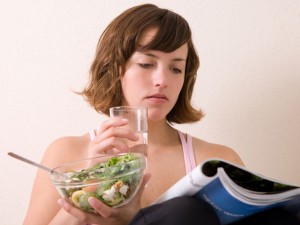 Digestion depends on many factors for a healthy and comfortable outcome. A few things that can negatively impact digestion are overeating, eating too much fat at one meal, and being stressed while eating.Have you ever thought about how what you drink or how much you drink during a meal could affect your digestion as well?
Digestion depends on many factors for a healthy and comfortable outcome. A few things that can negatively impact digestion are overeating, eating too much fat at one meal, and being stressed while eating.Have you ever thought about how what you drink or how much you drink during a meal could affect your digestion as well?
If you have done any amount of research about whether or not to drink liquids with your meals, then you might be confused about what you should be doing!
Many people believe that drinking liquids with meals will disrupt the digestion process and cause discomforts such as indigestion, heart burn, irritability, bloating, lethargy, headaches,and cravings.
Liquids of some kind are vital to the digestive process.Our mouths create saliva while eating that contains digestive enzymes to help break down food. Our stomachs contain gastric juices that aid in digestion and are important in killing bacteria we might consume in our food. It is important these juices work properly as they help break down food and allow the stomach to crush the food and push it into the small intestine.
The nutrients from the food we eat are sent through the bloodstream to the liver. The liver sends the nutrients to different areas of the body, deciding what to keep for later and what to use right away. The liver requires a sufficient amount of water to function and do its job properly.
So, is it beneficial to drink while you eat? The answer to that question depends on you and how it makes you feel.
However, there are some things to avoid.
Don’t drink cold water with your meals.
An idea that gained popularity a few years ago was that drinking cold water increased your metabolism, so theoretically you could drink cold water all day long and lose weight! What an exciting thought! However, this isn’t entirely true! While drinking cold water does speed up your metabolism a little, if you are drinking cold water during a meal then you are using energy to heat up the water that should be used for digestion.
When you are eating, you want your body to be able to focus all your energy at breaking down food so your body can easily absorb nutrients and eliminate waste. Poor digestion could actually cause you to gain weight, because toxins can build up in your digestive organs which can inhibit your ability to breakdown fat.
Don’t drink liquids with your meals.
Drinking liquids during your meal dilutes naturally occurring enzymes that aid in digestion which makes it harder to breakdown food. If you are chewing adequately then you are creating saliva and should be able to eat comfortably without lots of extra liquids. Let your saliva naturally help you swallow your food.
On the flip side
Drinking water helps your stomach liquefy food. This may aid digestion and nutrient absorption. It may also prevent constipation and bloating by keeping your stools soft and your digestive tract lubricated. Drinking water with your meals has been used as a weight loss tool by helping to fill you up faster.
If I don’t drink water with my meals, when should I drink it?
Drink water or other liquids 20-30 minutes before you eat and wait at least 30 minutes after.
It is clear that drinking water before and after you eat is beneficial to the digestive process. Drinking water about 30 minutes before you eat will help keep your body hydrated which results in optimal digestion. Drinking water about 30 minutes after a meal can also help in hydrating the body during the latter parts of the digestive process.
Keep in mind that if you are dehydrated then drinking liquid during a meal would be more helpful than not drinking while eating. If you are dehydrated, your body is going to struggle in order to digest food and deliver nutrients where they are needed.
What about my coffee?
Coffee has some beneficial side effects in the digestive system,it relieves constipation and minimizes sugar absorption. However, coffee can worsen stomach aches, increase fluid loss, and make food move through the digestive tract too fast.
The caffeine found in coffee makes your heart rate go up, which increases blood circulation. This includes more blood flowing to your kidneys. As a result, you’ll have an increase in urine production. If you are a coffee drinker, be sure to drink plenty of water throughout the day to make up for the increased fluid loss from coffee, or you could become dehydrated.
What if I really like to drink something with my meals?
If you can’t give up something to drink with your meals, try room temperature water with lemon or some warm herbal tea – the temperature will be closer to your body’s normal heat. These options will ease digestion instead of disrupting it.
Yes, it’s okay to drink water along with a meal, just don’t chug down too much. Try to keep it to an 8 ounce cup or less.
To Drink or Not to Drink
Drinking too much water during meals can interfere with the levels of bile and stomach acid, slowing the digestion process and decreasing the body’s ability to produce enough digestive enzymes. Poor digestion can lead to a buildup of toxic waste, no matter what you are eating.
Alcoholic drinks and acidic beverages like soda, can dry up the saliva your mouth produces, which makes it more difficult to properly digest your food. Consuming water or other beverages while they are cold also slows down the digestive process and can create cramping in some people.Some individuals may prefer to decrease or eliminate drinking water during meals, and may experience better digestion by doing so.
Here are some basic tips to help you know how to handle liquids with meals:
- Stay hydrated throughout the day.
- If you must drink while you eat, avoid drinking too much.
- Avoid alcohol and acidic drinks during meals.
- If you feel like you need a drink during meals, drink warm water and drink it sparingly. A small amount will likely not interfere with digestion. Try drinking ginger tea or add a dash of apple cider vinegar or lemon to your warm water. These additions are beneficial for digestion.
- Try drinking 30 minutes before and 30 minutes after your meal with no fluids during the actual meal and see how you feel. If it works for you, then stick with it, if not, adjust accordingly.
Do you constantly suffer from bloating, gas or indigestion when you drink water during meals?
If yes, you could be suffering from digestive issues, go to the next page and watch the 3 tips to reverse these digestive-related issues –
References
http://www.heartmdinstitute.com/126-hmd-root/hmd-articles/533-ice-water-with-meals-think-twice
http://www.mayoclinic.org/healthy-lifestyle/nutrition-and-healthy-eating/expert-answers/digestion/faq-20058348
http://www.drsinatra.com/drinking-cold-water-with-meals-think-again/
Drinking Liquids During Your Meals Can Impair Digestion
About the Author:

Carrine Judy is a registered dietitian who likes to encourage people to nourish their bodies with whole foods and plant based diets. One of her favorite things to do is find a tasty looking recipe and add a few more fruits or veggies to it… while still keeping it delicious!
She is still trying to convince her 4 year old that dark green leafy vegetables are really good without being covered in ranch dressing! She is a busy homeschooling mom of 6 who loves perusing cook books and reading historical fiction. She enjoys spending time with her family, especially when they are playing games or hiking.
Which wonderful friends in your life would appreciate learning about drinking liquid with meals?
Please help them by sharing this eye-opening article with each of them using any of the social media and email buttons below.

Leave a Reply